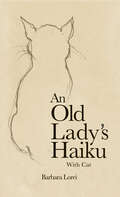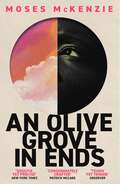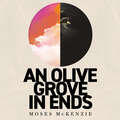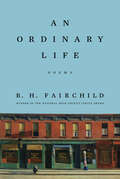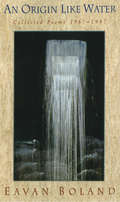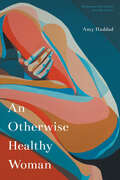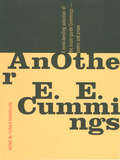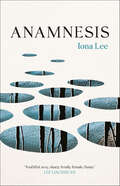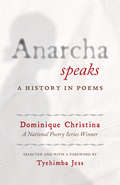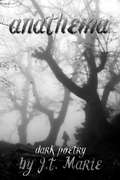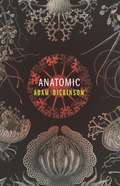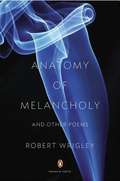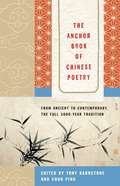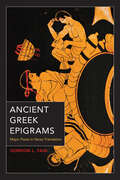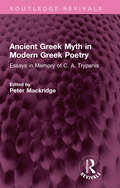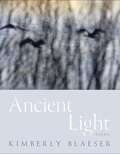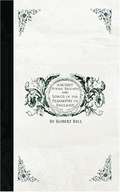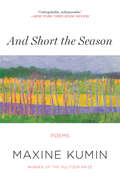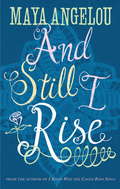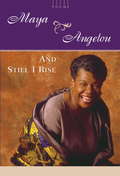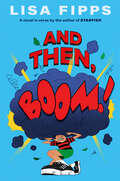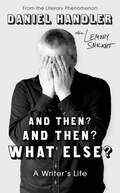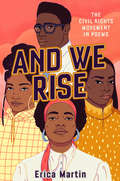- Table View
- List View
An Old Lady’s Haiku with Cat
by Barbara LoreiAt this point in my life, I&’m committed to my work, driven by a deep desire to communicate and explore the many mysteries around us. In a time when it&’s more urgent than ever to care for nature and one another, I create not just to please, but to provoke – to gently pause others in their tracks, inviting them to experience the profound, the playful, and perhaps to leave a little bit changed.My art and haiku often draw on mythology, religion, nature, and personal memories. In this way, I see myself as a storyteller, hoping to intrigue anyone who takes a moment to stop and look.
An Olive Grove in Ends: The dazzling debut novel about love, faith and community, by an electrifying new voice
by Moses McKenzie*** ONE OF THE OBSERVER'S 10 MUST-READ DEBUT NOVELISTS OF 2022 ***'A rare glimpse into the harsh realities of street life and love in luminous prose, rendered with sensitivity and without sentimentalism. An astonishing debut' Cherie Jones, author of HOW THE ONE-ARMED SISTER SWEEPS HER HOUSESayon Hughes, a young Black man from Bristol, dreams of a world far removed from the one in which he was raised. Far removed from the torn slips outside the bookie's, the burnt spoons and the crooked solutions his community embraces; most of all, removed from the Christianity of his uncaring parents and the prejudice of law-makers.Growing up, Sayon found respite from the chaos of his environment in the love and loyalty of his brother-in-arms, Cuba; in the example of his cousin Hakim, a man once known as the most infamous drug-dealer in their neighbourhood, now a proselytising Muslim; and in the tenderness of his girl, Shona, whose own sense of purpose galvanises Sayon's. In return, Sayon wants to give the people he loves the world: a house atop a grand hill in the most affluent area of the city, a home in which they can forever find joy and safety. But after an altercation in which a boy is killed, Sayon finds his loyalties torn and his dream of a better life in peril.MORE PRAISE FOR AN OLIVE GROVE IN ENDS:'A remarkable debut, bristling with sharp prose and daring originality' Nathan Harris, author of THE SWEETNESS OF WATER'A phenomenally good novel, tense and thrilling and complex, with breath-stealing moments on every page' Donal Ryan, author of STRANGE FLOWERS'This consummately crafted work can only be a harbinger of a stellar and truly significant career. I urge you to read it' Patrick McCabe, author of THE BUTCHER BOY'Engrossing . . . A tough yet tender story of faith and friendship' OBSERVER
An Olive Grove in Ends: The dazzling debut novel about love, faith and community, by an electrifying new voice
by Moses McKenzieONE OF THE OBSERVER'S 10 MUST-READ DEBUT NOVELISTS OF 2022SOHO HOUSE BREAKTHROUGH WRITER AWARD 2022 WINNER'A rare glimpse into the harsh realities of street life and love in luminous prose, rendered with sensitivity and without sentimentalism. An astonishing debut' Cherie Jones, author of HOW THE ONE-ARMED SISTER SWEEPS HER HOUSESayon Hughes, a young Black man from Bristol, dreams of a world far removed from the one in which he was raised. Far removed from the torn slips outside the bookie's, the burnt spoons and the crooked solutions his community embraces; most of all, removed from the Christianity of his uncaring parents and the prejudice of law-makers.Growing up, Sayon found respite from the chaos of his environment in the love and loyalty of his brother-in-arms, Cuba; in the example of his cousin Hakim, a man once known as the most infamous drug-dealer in their neighbourhood, now a proselytising Muslim; and in the tenderness of his girl, Shona, whose own sense of purpose galvanises Sayon's. In return, Sayon wants to give the people he loves the world: a house atop a grand hill in the most affluent area of the city, a home in which they can forever find joy and safety. But after an altercation in which a boy is killed, Sayon finds his loyalties torn and his dream of a better life in peril.MORE PRAISE FOR AN OLIVE GROVE IN ENDS:'Announcing the arrival of a promising 23-year-old author whose work is wise beyond his years' GUARDIAN'A remarkable debut, bristling with sharp prose and daring originality' Nathan Harris, author of THE SWEETNESS OF WATER'A phenomenally good novel, tense and thrilling and complex, with breath-stealing moments on every page' Donal Ryan, author of THE SPINNING HEART'This consummately crafted work can only be a harbinger of a stellar and truly significant career. I urge you to read it' Patrick McCabe, author of THE BUTCHER BOY'Engrossing . . . A tough yet tender story of faith and friendship' OBSERVER
An Ordinary Life: Poems
by B. H. FairchildA poet whose work is “a cause of celebration” (John Freeman, Boston Globe) reveals the extraordinary within the ordinary. In this stirring volume, award-winning poet B. H. Fairchild seeks the ironic, haunting presence imbuing each ordinary life with beauty, power, and meaning. By turns polyphonic and deeply personal, these poems range from Kansas highways and sunbaked baseball fields to secondhand memories of a World War II foxhole. They zoom in on a welder’s truck, a Walmart on Black Friday, and a record store, where a chance encounter offers radiant kindness in the face of grief. In a suite of prose poems written in the returning persona of the machinist and philosopher Roy Eldridge Garcia, “a watcher of things,” Fairchild finds sacred meaning in domestic scenes and expansive imagined narratives. Throughout, the poet evokes the brutal beauty of the American heartland, a morning’s “sheet-metal sky” and a grandfather’s farm, with its “dusty creek, damp / only when the winter wheat was bogged / in snow.” Elevating blue-collar work and scenes from small towns in clear-eyed, reverent poetry, Fairchild proves himself once again “the American voice at its best: confident and conflicted, celebratory and melancholic” (New York Times).
An Origin Like Water: Collected Poems 1957-1987
by Eavan Boland"Readers of this work will recognize and relish the way this collection charts a life's course."--Publishers Weekly Here, from one of our major poets, is the collected early work that has been long unavailable in this country. Included in this volume is the work from Eavan Boland's five early volumes of poetry: New Territory, The War Horse, In Her Own Image, Night Feed, and The Journey. The poems from Boland's first book, New Territory, show her to be, at twenty-two, a master of formal verse reflecting Irish history and myth. This collection charts the ways in which Boland's work breaks from poetic tradition, honors it, and reinvents it. Poems like "Anorexic," "Mastectomy," and "Witching" have an intensity reminiscent of Sylvia Plath and Anne Sexton. In later poems, her subjects become more personal, sequencing Boland's life as a woman, poet, and mother. Boland writes, "I grew to understand the Irish poetic tradition only when I went into exile with it," becoming, in effect, "a displaced person / in a pastoral chaos." This collection demonstrates how Boland's mature voice developed from the poetics of inner exile into a subtle, flexible idiom uniquely her own.
An Otherwise Healthy Woman (The Backwaters Prize in Poetry Honorable Mention)
by Amy HaddadThe poems in An Otherwise Healthy Woman delve into the complexity of modern health care, illness, and healing, offering an alternative narrative to heroics and miracles. Drawing on Amy Haddad&’s firsthand experiences as a nurse and patient, the poems in this collection teach us to take a moment to stop and acknowledge the longing for compassion in each of us, what ought to be the immediate human response to suffering. The poet isn&’t afraid to explore her own fears and failures or to find joy and humor in the many roles women play. An Otherwise Healthy Woman presents the intimate experiences of a nurse, the vulnerable perspective of a patient, and the lessons of caring for family.
AnOther E.E. Cummings
by E. E. Cummings Richard Kostelanetz<P>An eye-opening selection of Cumming's more avant-garde poetry and prose. <P>As a poet, Cummings was a pioneer not only in linguistic and typographic inventions, but also in sound and concrete poetry. But his prose is no less experimental; he wrote memoirs, essays, and fiction that are constantly provocative and often radically experimental. <P>To read the avant-garde Cummings is to read a writer who consistently broke with established norms, "never to rest and never to have: only to grow." To not read the avant-garde Cummings is to not read Cummings. <P>Adjusting type size may change line breaks. Landscape mode may help to preserve line breaks.
Anamnesis
by Iona LeeIona Lee’s debut collection charts the journey of the writer, artist and performer into adulthood. Written in a unique voice, Iona playfully toys with thematic devices in this entertaining exploration of art and artifice, absence and impermanence, truth and tale telling. Characterised by a deep love of language, its music and its magic, these poems reflect on memory, the future and other hauntings. Wittily observed, this collection is an attempt to connect the stars into tidy constellations, and to join the tiny, inchoate dots of self into something traceable and translatable. Humorous and self-aware, gentle and philosophical, Anamnesis is written in the knowledge that in telling one’s life-story, one creates it.
Anarcha Speaks: A History in Poems
by Tyehimba Jess Dominique ChristinaThe reimagined story of Anarcha, an enslaved Black woman, subjected to medical experiments by Dr. Marion Sims. Selected by Tyehimba Jess as a National Poetry Series winner.In this provocative collection by award-winning poet and artist Dominique Christina, the historical life of Anarcha is personally reenvisioned. Anarcha was an enslaved Black woman who endured experimentation and torture at the hands of Dr. Marion Sims, more commonly known as the father of modern gynecology. Christina enables Anarcha to tell her story without being relegated to the margins of history, as a footnote to Dr. Sims's life. These poems are a reckoning, a resurrection, and a proper way to remember Anarcha ... and grieve her.
Anathema
by J. T. MarieChapbook of dark poems about vampires, aliens, angels, demons, monsters, diseases, villains, rogues, and the sea. The bulk of these were written during my years as an undergraduate student at George Mason University, in Fairfax, Virginia, and represent some of my favorite themes: death, lost love, the ocean, alienation, and (odd as it may seem) disease.
Anatomic
by Adam Dickinson<P>The poems of Anatomic have emerged from biomonitoring and microbiome testing on the author's body to examine the way the outside writes the inside, whether we like it or not. Adam Dickinson drew blood, collected urine, swabbed bacteria, and tested his feces to measure the precise chemical and microbial diversity of his body. To his horror, he discovered that our "petroculture" has infiltrated our very bodies with pesticides, flame retardants, and other substances. He discovered shifting communities of microbes that reflect his dependence on the sugar, salt, and fat of the Western diet, and he discovered how we rely on nonhuman organisms to make us human, to regulate our moods and personalities. <P>Structured like the hormones some of these synthetic chemicals mimic in our bodies, this sequence of poems links the author’s biographical details (diet, lifestyle, geography) with historical details (spills, poisonings, military applications) to show how permeable our bodies are to the environment. As Dickinson becomes obsessed with limiting the rampant contamination of his own biochemistry, he turns this chemical-microbial autobiography into an anxious plea for us to consider what we’re doing to our world -- and to our own bodies.
Anatomy of Melancholy and Other Poems
by Robert WrigleyA powerful new collection from an award-winning poet Robert Wrigley has become one of his generation's most accomplished poets, renowned for his irony, power, and lucid style and for his ability to fuse narrative and lyrical impulses. Like its namesake--Robert Burton's seventeenth-century examination of human thoughts and emotions--Wrigley's new collection means to examine our world through the lens of melancholia. From imagined war memorials to insomniac chickens; from Descartes' lost daughter to a dreaming tree; from King Kong to Rush Limbaugh; and from Anna Karenina to a man named Lucy Doolin (short for Lucifer), these are poems that elegize and celebrate that most beautiful, exasperating, joyous, miserable, and perfectly imperfect of all creatures--the human being.
Anchor Book of Chinese Poetry
by Tony Barnstone Chou PingUnmatched in scope and literary quality,The Anchor Book of Chinese Poetryspans three thousand years, bringing together more than six hundred poems by more than one hundred thirty poets, in translations–many new and exclusive to the book–by an array of distinguished translators. Here is the grand sweep of Chinese poetry, from theBook of Songs–ancient folk songs said to have been collected by Confucius himself–and Laozi’sDao De Jingto the vividly pictorial verse of Wang Wei, the romanticism of Li Po, the technical brilliance of Tu Fu, and all the way up to the twentieth-century poetry of Mao Zedong and the post—Cultural Revolution verse of the Misty poets. Encompassing the spiritual, philosophical, political, mystical, and erotic strains that have emerged over millennia, this broadly representative selection also includes a preface on the art of translation, a general introduction to Chinese poetic form, biographical headnotes for each of the poets, and concise essays on the dynasties that structure the book. A landmark anthology,The Anchor Book of Chinese Poetrycaptures with impressive range and depth the essence of China’s illustrious poetic tradition.
Ancient Greek Epigrams: Major Poets in Verse Translation
by Gordon L. FainAfter Sappho but before the great Latin poets, the most important short poems in the ancient world were Greek epigrams. Beginning with simple expressions engraved on stone, these poems eventually encompassed nearly every theme we now associate with lyric poetry in English. Many of the finest are on love and would later exert a profound influence on Latin love poets and, through them, on all the poetry of Europe and the West. This volume offers a representative selection of the best Greek epigrams in original verse translation. It showcases the poetry of nine poets (including one woman), with many epigrams from the recently discovered Milan papyrus. Gordon L. Fain provides an accessible general introduction describing the emergence of the epigram in Hellenistic Greece, together with short essays on the life and work of each poet and brief explanatory notes for the poems, making this collection an ideal anthology for a wide audience of readers.
Ancient Greek Myth in Modern Greek Poetry: Essays in Memory of C. A. Trypanis (Routledge Revivals)
by Peter MackridgeOriginally published in 1996, this volume contains essays by scholars, critics and translators and includes themes such as the myth in the Cretan Renaissance and the use of ancient myth by 19th and 20th Century poets. Some essays deal with individual mythical figures such as Odysseus, Orpheus, Prometheus and Aphrodite, while others deal with the problematic issue of the use of myth by Greek women poets. The discussion is completed by comparing attitudes to the ancient Greeks as embodied in English and modern Greek poetry.
Ancient Light: Poems (Volume 94) (Sun Tracks)
by Kimberly BlaeserElegiac and powerful, Ancient Light uses lyric, narrative, and concrete poems to give voice to some of the most pressing ecological and social issues of our time. With vision and resilience, Kimberly Blaeser’s poetry layers together past, present, and futures. Against a backdrop of pandemic loss and injustice, MMIW (Missing and Murdered Indigenous Women), hidden graves at Native American boarding schools, and destructive environmental practices, Blaeser’s innovative poems trace pathways of kinship, healing, and renewal. They celebrate the solace of natural spaces through sense-laden geo-poetry and picto-poems. With an Anishinaabe sensibility, her words and images invoke an ancient belonging and voice the deep relatedness she experiences in her familiar watery regions of Minnesota. The collection invites readers to see with a new intimacy the worlds they inhabit. Blaeser brings readers to the brink, immerses them in the darkest regions of the Anthropocene, in the dangerous fallacies of capitalism, and then seeds hope. Ultimately, as the poems enact survivance, they reclaim Indigenous stories and lifeways.
Ancient Philosophical Poetics
by Malcolm HeathWhat is poetry? Why do human beings produce and consume it? What effects does it have on them? Can it give them insight into truth, or is it dangerously misleading? This book is a wide-ranging study of the very varied answers which ancient philosophers gave to such questions. An extended discussion of Plato's Republic shows how the two discussions of poetry are integrated with each other and with the dialogue's central themes. Aristotle's Poetics is read in the context of his understanding of poetry as a natural human behaviour and an intrinsically valuable component of a good human life. Two chapters trace the development of the later Platonist tradition from Plutarch to Plotinus, Longinus and Porphyry, exploring its intellectual debts to Epicurean, allegorical and Stoic approaches to poetry. It will be essential reading for classicists as well as ancient philosophers and modern philosophers of art and aesthetics.
Ancient Poems, Ballads, and Songs of the Peasantry of England
by Robert BellAncient Poems, Ballads, and Songs of the Peasantry of England
Ancient Poems, Ballads, and Songs of the Peasantry of England
by Robert BellRobert Bell edited Ancient Poems, Ballads, and Songs of the Peasantry of England. Robert Bell states in his preface his belief in the realism of the English peasantry. <P> <P> "The value of this volume consists in the genuineness of its contents, and the healthiness of its tone. While fashionable life was masquerading in imaginary Arcadias, and deluging theatres and concert rooms with shams, the English peasant remained true to the realities of his own experience, and produced and sang songs which faithfully reflected the actual life around him. Whatever these songs describe is true to that life. There are no fictitious raptures in them. Love here never dresses its emotions in artificial images, nor disguises itself in the mask of a Strephon or a Daphne. It is in this particular aspect that the poetry of the country possesses a permanent and moral interest."
And Short the Season: Poems
by Maxine KuminFrom the Pulitzer Prize-winning poet, a stunning collection of poems that course with the rhythms of nature. A poet of piercing revelations and arresting imagery, Pulitzer Prize winner Maxine Kumin is "unforgettable, indispensable" (New York Times Book Review). In And Short the Season, her stunning last collection, she muses on mortality: her own, and that of the earth. These deeply personal, always political poems blend myth and modernity, fecundity and death, and the violence and tenderness of humankind.
And Still I Rise: A Book Of Poems
by Dr Maya AngelouA beautiful and inspiring collection of poetry by Maya Angelou, author of I KNOW WHY THE CAGED BIRD SINGS and 'a brilliant writer, a fierce friend and a truly phenomenal woman' (BARACK OBAMA).'I write about being a Black American woman, however, I am always talking about what it's like to be a human being. This is how we are, what makes us laugh, and this is how we fall and how we somehow, amazingly, stand up again' Maya AngelouMaya Angelou's poetry - lyrical and dramatic, exuberant and playful - speaks of love, longing, partings; of Saturday night partying, and the smells and sounds of Southern cities; of freedom and shattered dreams. 'Her poetry is just as much a part of her autobiography as I Know Why the Caged Bird Sings and the volumes that follow.' Kirkus'It is true poetry she is writing . . . it has an innate purity about it, unquenchable dignity' M. F. K. Fisher
And Still I Rise: A Book of Poems
by Maya AngelouMaya Angelou&’s unforgettable collection of poetry lends its name to the documentary film about her life, And Still I Rise, as seen on PBS&’s American Masters. Pretty women wonder where my secret lies. I&’m not cute or built to suit a fashion model&’s size But when I start to tell them, They think I&’m telling lies. I say, It&’s in the reach of my arms, The span of my hips, The stride of my step, The curl of my lips. I&’m a woman Phenomenally. Phenomenal woman, That&’s me. Thus begins &“Phenomenal Woman,&” just one of the beloved poems collected here in Maya Angelou&’s third book of verse. These poems are powerful, distinctive, and fresh—and, as always, full of the lifting rhythms of love and remembering. And Still I Rise is written from the heart, a celebration of life as only Maya Angelou has discovered it. &“It is true poetry she is writing,&” M.F.K. Fisher has observed, &“not just rhythm, the beat, rhymes. I find it very moving and at times beautiful. It has an innate purity about it, unquenchable dignity. . . . It is astounding, flabbergasting, to recognize it, in all the words I read every day and night . . . it gives me heart, to hear so clearly the caged bird singing and to understand her notes.&”
And Then, Boom!
by Lisa FippsA gripping new novel in verse by the author of the Printz Honor-winning Starfish, featuring a poverty-stricken boy who bravely rides out all the storms life keeps throwing at himJoe Oak is used to living on unsteady ground. His mom can&’t be depended on as she never stays around long once she gets &“the itch,&” and now he and his beloved grandmother find themselves without a home. Fortunately, Joe has an outlet in his journals and drawings and takes comfort from the lessons of comic books—superheroes have a lot of &“and then, boom&” moments, where everything threatens to go bust but somehow they land on their feet. And that seems to happen a lot to Joe too, as in this crisis his friend Nick helps them find a home in his trailer park. But things fall apart again when Joe is suddenly left to fend for himself. He doesn&’t tell anyone he&’s on his own, as he fears foster care and has hope his mom will come back. But time is running out—bills are piling up, the electricity&’s been shut off, and the school year&’s about to end, meaning no more free meals. The struggle to feed himself gets intense, and Joe finds himself dumpster diving for meals. He&’s never felt so alone—until an emaciated little dog and her two tiny pups cross his path. And fate has even more in store for Joe, because an actual tornado is about to hit home—and just when it seems all is lost, his life turns in a direction that he never could have predicted.
And Then? And Then? What Else?: A Writer's Life
by Lemony Snicket Daniel HandlerA memoir from the beloved author behind the multimillion-copy bestselling A SERIES OF UNFORTUNATE EVENTS &‘Extraordinary... highly entertaining.&’ DAILY TELEGRAPH Known to most as Lemony Snicket, the tormented narrator of A Series of Unfortunate Events, Daniel Handler spends his days writing – for children and adults; film and television; and, occasionally, the accordion. Mainly, he writes about horrible things: orphans, abusive uncles, poison, murder, arson, bad grammar… A love letter to the consoling and terrifying power of books, And Then? And Then? What Else? traces Handler&’s life through morbid poetry collections, eccentric acting troupes, hazy midnight taxi rides, second-hand bookstores and psychiatric units. Traversing his personal canon from his first encounter with Baudelaire to Vladimir Nabokov, Elizabeth Bishop and The Pet Shop Boys, Handler offers a witty, poignant exploration of reading, writing and why we tell stories. &‘This erudite, vulnerable, funny and idiosyncratic book ranks among his best. Grown-up fans of Lemony Snicket will enjoy discovering the rest of the story.&’ WALL STREET JOURNAL
And We Rise
by Erica MartinA powerful, impactful, eye-opening journey that explores through the Civil Rights Movement in 1950s-1960s America in spare and evocative verse, with historical photos interspersed throughout.In stunning verse and vivid use of white space, Erica Martin's debut poetry collection walks readers through the Civil Rights Movement—from the well-documented events that shaped the nation&’s treatment of Black people, beginning with the "Separate but Equal" ruling—and introduces lesser-known figures and moments that were just as crucial to the Movement and our nation's centuries-long fight for justice and equality.A poignant, powerful, all-too-timely collection that is both a vital history lesson and much-needed conversation starter in our modern world. Complete with historical photographs, author's note, chronology of events, research, and sources.
